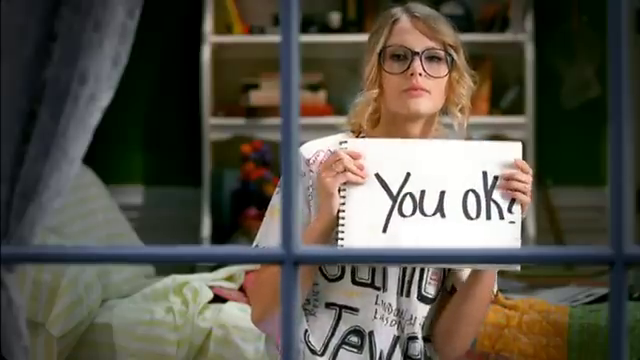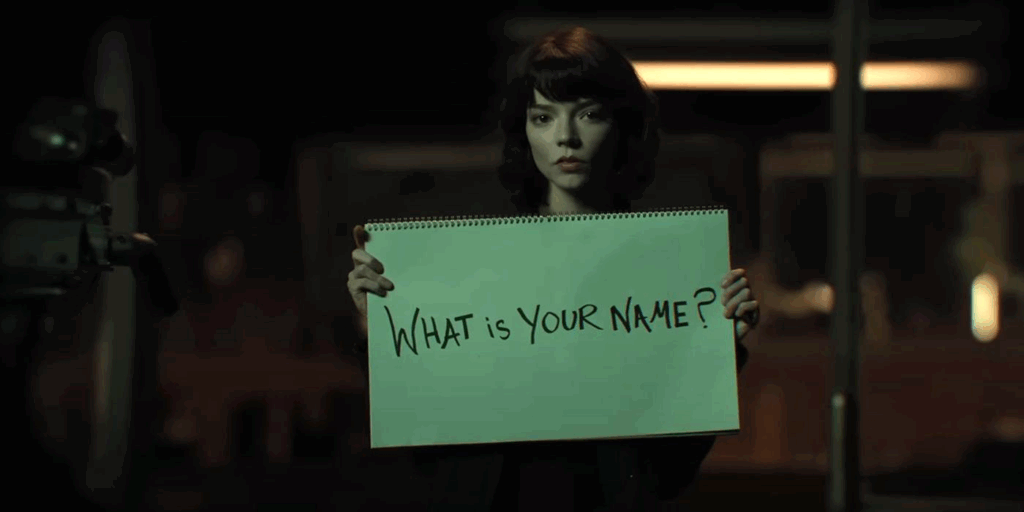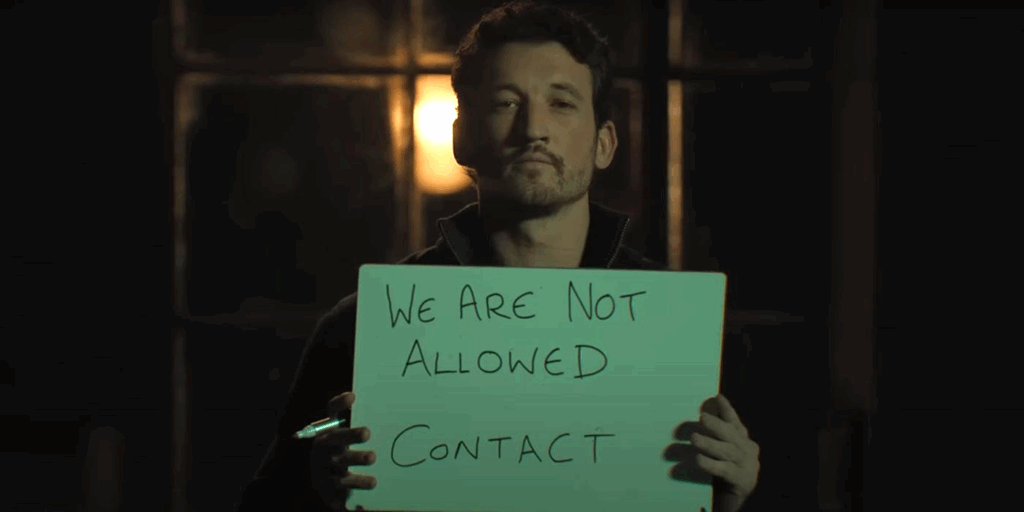I feel like you're just here for the zipline
Today, I come to discuss a film that features two heartsick loners stuck on opposite ends of a chasm. Between them is an expanse both physical and metaphorical. The only way they can communicate is to hold up signs scrawled with messages for the other to read. The notes turn into flirting. The guy spies and catches the girl doing a goofy dance. Later, one of them comforts the other with some reassuring jotted signs when they’re facing major heartache. And then, one dramatic evening, they put it all on the line. They share their feelings for each other… in person. And nothing is ever the same.
I am referring, of course, to the music video for “You Belong With Me.”
Er… I mean, the new Apple movie The Gorge.




I do not know for sure whether The Gorge’s screenwriter, Zach Dean, was directly inspired by Taylor Swift’s seminal 2009 music video. (Have I devoted a whole podcast episode to this music video? Yes, I have.) With some quick searching, the only background I could find on the screenplay was that it appeared on the Black List, that famous survey of unproduced but well-loved screenplays. But I like to imagine Dean watching the music video one day and saying “you know, this would make a good sci-fi action movie.”
Anyways, there’s more to The Gorge than the long-distance, sign-based romance between Levi (Miles Teller) and Drasa (Anya Taylor-Joy), though it is certainly my favorite part of the film. Levi is a PTSD-plagued ex-Marine sniper stationed at one tower overlooking a mysterious ravine; Drasa, a Lithuanian sniper with a sick dad and a big gun, guards the other. They operate in complete isolation. Their job? Keep whatever’s in the gorge from getting out. Inside the gorge is some powerful danger (our experience with such films suggests aliens, ancient secrets, or nuclear/biochemical government secrets — perhaps a combination of all three). We learn soldiers have entered the gorge and never returned. Eventually, we witness shadows of creatures down there nicknamed the Hollow Men. The gorge is protected with a fail-safe obliteration protocol called “Straydog,” ominously whispered and certainly unlikely to be deployed in the film’s third act.
Despite strict “no contact” orders between the two sides of the gorge, Drasa eventually cracks, waving a sign at Levi and sparking a sharpshooting competition. From there, things escalate in pleasantly ridiculous ways: turret teamwork, late-night chess, ziplines, parachute dives into monster-infested warzones, and Jeep-assisted cliff scaling. You know, normal stuff for the first few dates. Along the way, they uncover the secrets of the Hollow Men and make a plan to exterminate them. (Damn, if only there was a fail-safe obliteration protocol they could use.)

The Gorge has a few big problems. The first is that the sci-fi action itself is mediocre. The Hollow Men creatures are generic brown monsters — muddy, boring, and barely legible. All the physical mayhem is mostly awkwardly staged, underlit CGI blurriness. There are a few fun bits of tactical choreography: the aforementioned Jeep-on-a-winch moment is pretty fun. But most of the action plays out as a messy shrug. (It’s also very light on sniper-focused hijinks, which is surprising and disappointing given that “great, steady-handed shot under pressure” is one of the defining characteristics of both leads.)
The story suffers from serious pacing problems. The first 20 minutes or so, from Levi’s introduction all the way to his first night alone next to the gorge, could have been trimmed or at least streamlined. It’s not until Drasa initiates the sign flirtation that the movie locates any emotional pulse. Entire characters and subplots — like Drasa’s dying father or the extended sendoff of Levi’s predecessor J.D. (Sope Dirisu from Gangs of London) — take a lot of time and have little bearing on the story. And while I’m not fond of the action itself, it probably could have been spaced out to have a bit more impact: most of it appears during a relentless 40-minute stretch that kicks off around the midpoint.
I also am not entirely sold on the acting. Teller, in particular, is a tough fit for this kind of gravel-voiced tough guy role. Teller’s best acting requires a jitteriness — something boyish and neurotic — that doesn’t translate to a stoic soldier archetype. It’s a disappointing and miscast performance, and the script gives him little to work with beyond glowering. Taylor-Joy, by contrast, is having more fun. She leans into the accent and lets some silliness and flirtiness into the performance.

Still, it’s a perfectly watchable film. The direction by Scott Derrickson is pretty painless. It’s cleanly edited and has a tone that doesn’t collapse under the genre mash-up even as it fails to sparkle. Trent Reznor and Atticus Ross’s strong score helps with that, keeping the movie on the rails. Your mileage may vary, but my personal taste tends to favor character dynamics over spectacle, which may be why I found myself more invested in Levi and Drasa’s handwritten conversations than any of the film’s shootouts or paramilitary secrets. One friend described the film as “laundry folding cinema,” which is dead-on: pleasant enough background noise during chores with the occasional flicker of intrigue to keep you interested for most of the two hours.
There are a few charming flourishes, like the chess and drumming bonding montage that calls back (intentionally or unintentionally, I’m not sure) on the actors’ past iconic roles in The Queen’s Gambit and Whiplash. And I’ll always give some credit to a standalone original, especially if it has a clever hook.
And, hey, at least it didn’t have to go against Beyoncé’s “Single Ladies” at the 2009 VMAs.
Is It Good?
Nearly Good (4/8)
Dan is the founder and head critic of The Goods. Follow Dan on Letterboxd. Join the Discord for updates and discussion.


2 replies on “The Gorge (2025)”
*Minor Spoilers*
Big horror fan, so I found the monster designs to be interesting, and there was a good diversity of creatures and environments once they got going. The standout to me was that sticky bone venus tree trap, which would be a terrifying way to go. I got real Annihilation vibes from them early on, which made sense considering they kind of just took that same premise, but they were original enough for me not to dwell on it.
I thought they were going to squeeze in an intelligent monster trope considering the one Hollow Man that went after Drasa and took her to his “lair”. But, I guess that was just to eat her in the privacy of his bunker.
*Continuing Spoilers*
I shouldn’t have been so flippant about the creature design and should have elaborated my thoughts a bit, which I will do here: I wasn’t wild about the humanoids (it looked kinda Halloween costumey to me), but I liked some of the other ones, including the sticky bone plant you mentioned. I also liked the horsey fellow, although it was giving Game of Thrones “others” energy. I also think the lighting and foggy effect did not do much to bring out the creature design… it kinda dimmed out the designs for me, although it was cool when they shifted the colors on it throughout the action segments.
I read this article on the creature designs which increased my appreciation for them a little bit: https://www.framestore.com/work/gorge
I actually haven’t seen Annihilation! You recommend it? (One friend joked you could call this movie “Annihilationship”.)
If you have any horror recs, I’m always open ears!